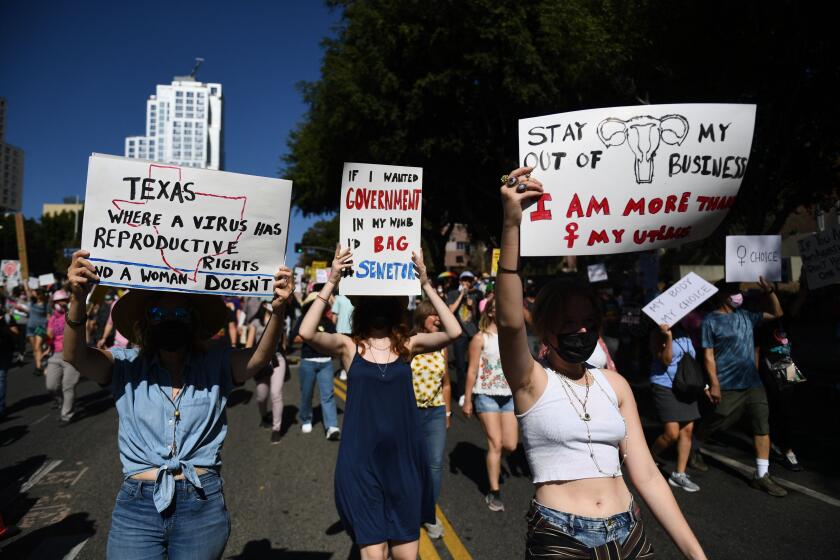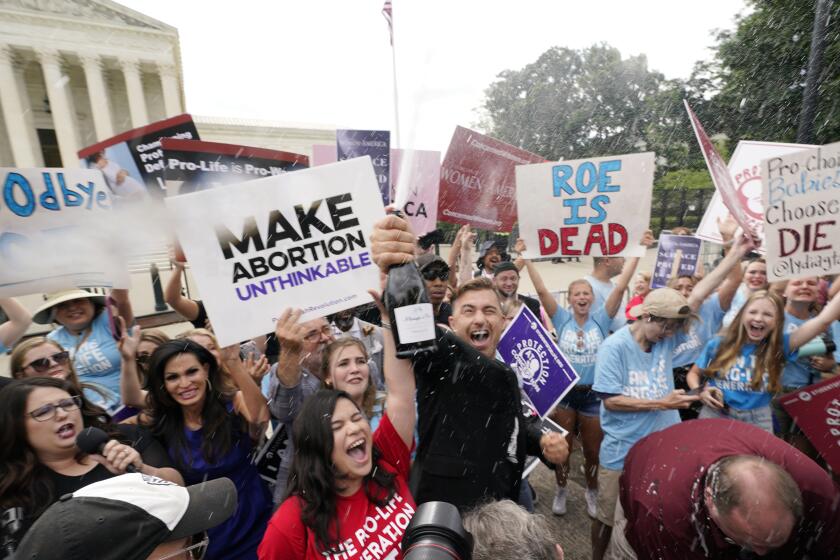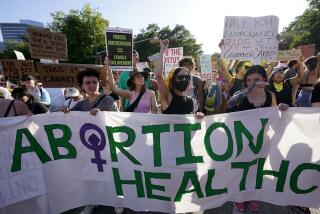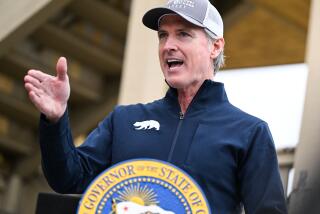In an America divided by abortion, guns and COVID, California and Newsom seize the moment
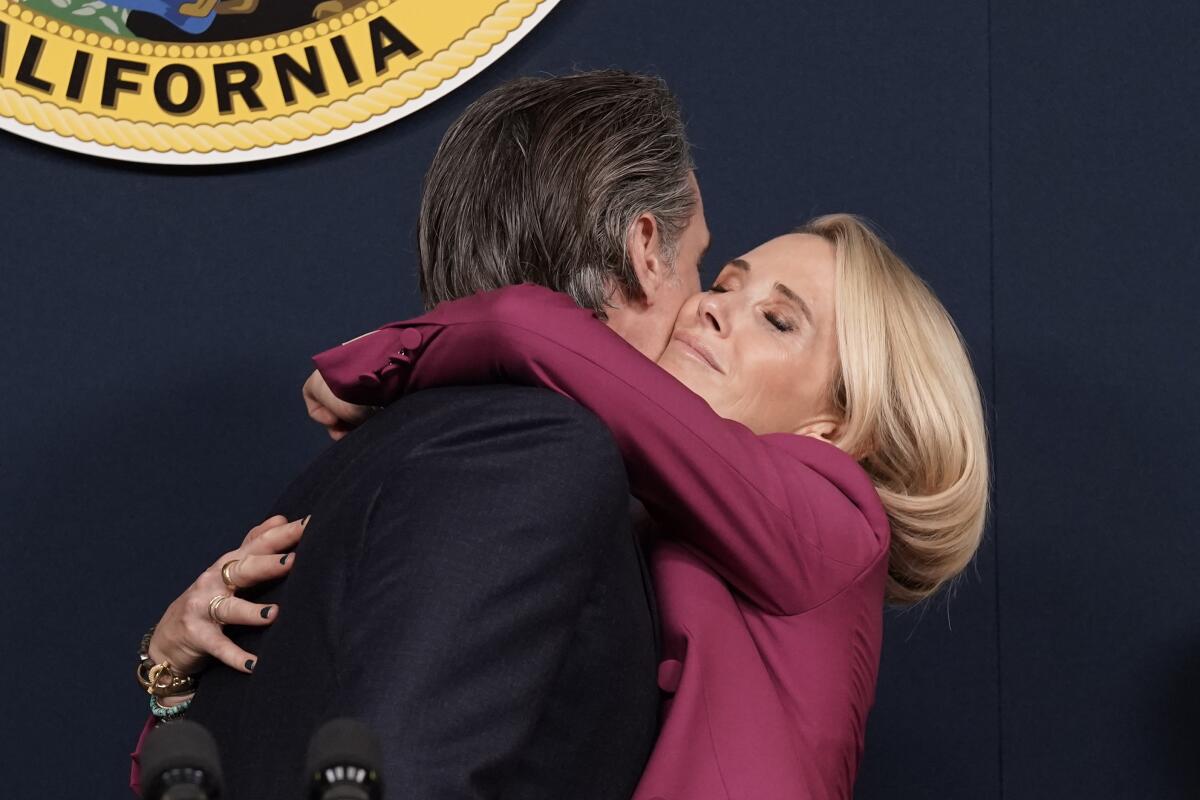
As his wife stood behind him and held back tears, Gov. Gavin Newsom on Friday called the Supreme Court decision to overturn Roe vs. Wade sickening and beckoned women in other states to California, their “sanctuary” for free abortion care.
In Texas, where performing an abortion will soon be a felony, Gov. Greg Abbott celebrated the ruling and promised he will “always fight to save every child from the ravages of abortion.”
The disparate responses from the governors of the two most populous states in the nation highlighted the stark political divide in America, deepened by radically different approaches to healthcare, gun control, the COVID-19 pandemic, LGBTQ rights, immigration and now, once again, reproductive rights.
“This is a serious moment in American history,” Newsom said. “This great divergence: Red states versus blue states.”
Newsom clearly embraces his rise as a dominant, resonating voice for Democratic states nationwide and as a foil of governors such as Abbott and Ron DeSantis of Florida, whom he condemns as disciples of the hard-right, Donald Trump wing of the Republican Party. This month, Newsom joined Trump’s fledgling social media network, Truth Social, he said, to call out “Republican lies.”
While launching his own offensive, Newsom also has criticized the national Democratic Party for failing to step up to the fight with conservatives.
States will now be permitted to ban abortions for the first time since the landmark Roe vs. Wade decision in 1973. What does this mean in California?
The governor joined with Govs. Kate Brown of Oregon and Jay Inslee of Washington on Friday in announcing a multistate commitment to defend access to reproductive health services and contraceptives. The states vowed to protect patients from GOP states that have threatened to ban their residents from seeking abortions elsewhere in response to the high court ruling.
“I want folks to know around the rest of the country, many parts of the globe, that I hope we’re your antidote to your fear, or anxiety, perhaps to the cynicism that many of you are feeling about the fate and future,” Newsom said.
The Supreme Court ruled that the Constitution does not protect the right to abortion, leaving that decision up to states.
Twenty states, mostly along the West Coast and in the Northeast and mid-Atlantic states, have policies designed to protect the right to end a pregnancy. Another 20, primarily in the South and the interior West, are moving quickly to ban or severely restrict that right. In the remaining 10 states, abortion remains hotly contested.
Though abortion will remain legal in California, residents across the state expressed outrage at the Supreme Court’s reversal of Roe vs. Wade.
The gulf between red and blue states has widened significantly in recent years. That reversed a long trend that started just after World War II of growing uniformity across the country, as legal racial segregation ended in the South and the federal government and courts expanded rights for all American citizens.
The split on abortion closely reflects public opinion in the states. In California, Oregon and Washington, for example, roughly 60% of residents said abortion should be legal in all or most cases, according to a 50-state survey by the Public Religion Research Institute in 2018. By contrast, only about 40% of people took that position in the most strongly antiabortion states, including Mississippi, Arkansas, Louisiana, South Dakota, Utah and Idaho.
The responses to the Roe decision also revealed the divide. DeSantis said that Florida, which previously passed a law banning abortions after 15 weeks that will take effect next week, would seek to expand its abortion restrictions.
Democratic Illinois Gov. J.B. Pritzker told WBEZ, the public radio station in Chicago, that he planned to call the state Legislature into a special session to consider ways to further protect abortion rights.
“I think broadly, we need to expand and assist in expanding the number of healthcare providers who can help uphold reproductive rights, perform abortions and other procedures,” he said. The state is predicting a large influx of patients from Missouri, Indiana and other nearby states with strict abortion limits.
By positioning California as a beacon for abortion rights, Newsom has drawn a sharp contrast with Texas, California’s perennial rival.
On abortion, the two states “occupy the polar opposites of the spectrum,” said Ken Miller, author of “Texas vs. California: A History of Their Struggle for the Future of America.”
Texas passed a “trigger law” to go into effect 30 days after the Supreme Court overturned Roe. The law bans nearly all abortions at the time of fertilization. That puts Texas among the 13 most restrictive states in the country.
California, meanwhile, “is as affirming of abortion rights and reproductive rights as any state could be,” said Miller, a professor of state and local politics at Claremont McKenna College.
Newsom on Friday also touted an effort to enshrine California’s abortion protections in the state’s Constitution, saying doing so will “codify our values.”
He also used the U.S. Supreme Court’s decision as an impetus for signing a bill that protects abortion providers in California from liability when caring for patients traveling from areas where the procedure is now banned or access is narrowed. Newsom said the law counters one passed in Texas last year allowing private citizens to sue anyone who “aids or abets” an abortion in the state after about six weeks of pregnancy.
Erwin Chemerinsky, dean of the UC Berkeley School of Law, said that while the right to travel, including to get an abortion, is protected, he expects conservative states will pass laws that try to prohibit women from leaving in order to get an abortion.
“That should be unconstitutional, but we’ll see what the court does,” Chemerinsky said.
The two states have also taken wildly divergent paths when it comes to guns and healthcare.
The day after the May 24 elementary school shooting in Uvalde, Texas, Newsom announced that he would back more than a dozen additional bills to further tighten California’s extensive gun-control laws. They include allowing the state Department of Justice, local governments and gun violence survivors to sue gun industry members for violating a “firearm industry standard of conduct.”
After the Uvalde shooting, Abbott argued that gun laws hadn’t stopped shootings in states such as California and said Texas should work on mental health.
“They’ve become representations of our national political division and polarization,” Miller said. “California envisions itself as leading the way in representing progressive values in these issues in the same way that Texas sees itself as the defender of the conservative views on the right.”
Last year, as the response to the COVID-19 pandemic became highly partisan, mask and vaccine mandates became political battlegrounds.
California was the first state to announce that it would require all public employees and healthcare workers to show proof of vaccination or be tested weekly. In Alabama, Gov. Kay Ivey signed a law last year banning employers from firing workers who refuse a COVID-19 vaccination if those employees claim a medical or religious exemption.
DeSantis fought mask mandates in Florida, submitting a budget this year that initially rewarded schools that did not enact universal mandates for students.
Newsom is no stranger to taking political risks, even if it means stepping out in front of his party.
In 2004, as the newly elected mayor of San Francisco, he decided to issue marriage licenses to same-sex couples in defiance of state law. More than 4,000 couples wed before the California Supreme Court put a halt to the issuances; those unions were later nullified.
The young mayor instantly became the national face for the gay marriage movement, much to the chagrin of both social conservatives and some gay rights activists, who worried his action would set back their cause. National Democrats chastised Newsom at the time and he was put on the defensive when John Kerry lost the presidential election that year.
But with Democrats eventually embracing same-sex marriage, which was made legal nationwide after a 2015 Supreme Court decision, Newsom is now seen as an early leader on that issue.
“Gavin Newsom is a really bold leader who follows his north star,” said Joyce Newstat, who served as Newsom’s policy director when he was mayor. “He did it back in 2004 with marriage equality, and he’s doing it again.”
Times senior editor David Lauter and staff writer Hannah Wiley contributed to this report.
More to Read
Start your day right
Sign up for Essential California for news, features and recommendations from the L.A. Times and beyond in your inbox six days a week.
You may occasionally receive promotional content from the Los Angeles Times.
